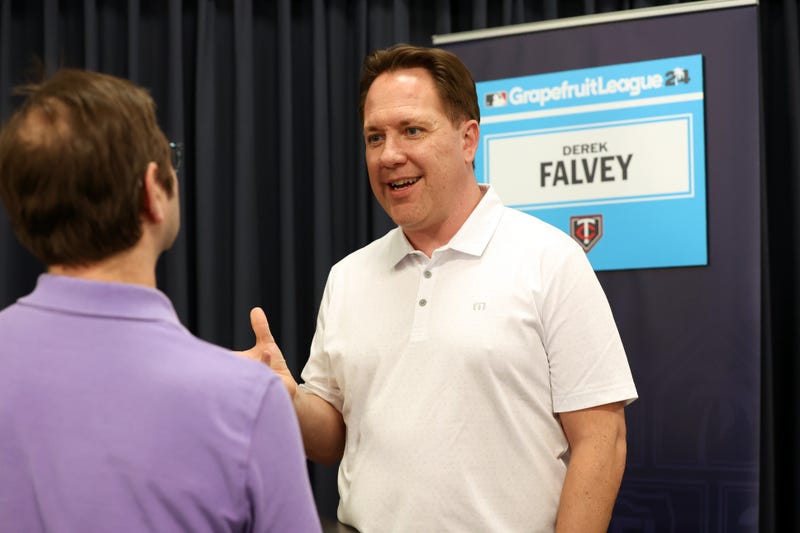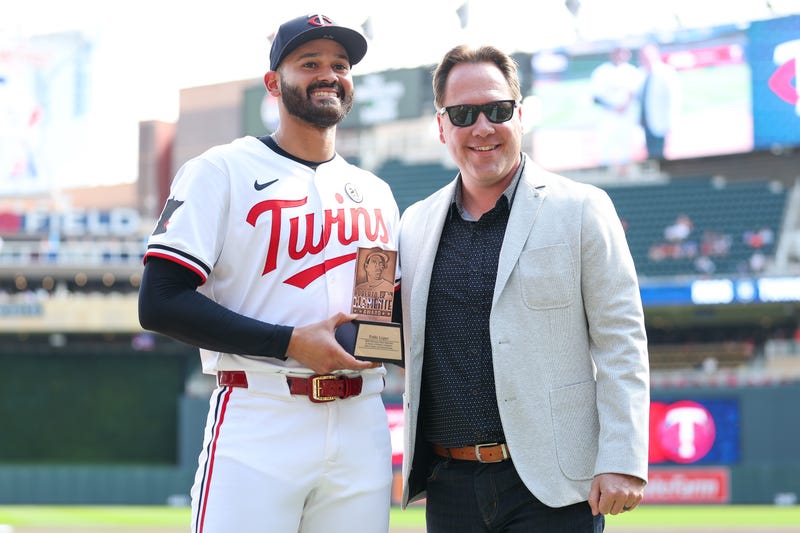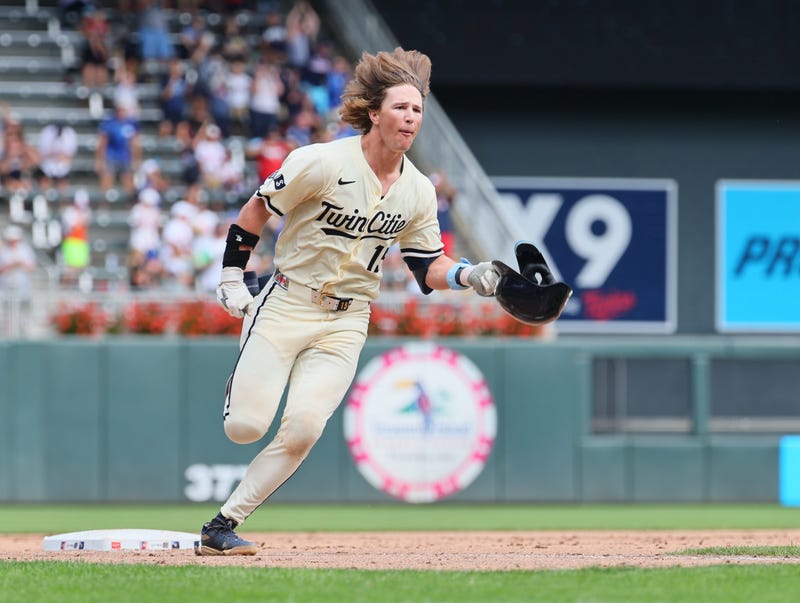
What a couple of weeks for the Minnesota Twins.
A losing streak coming out of the All-Star Break basically put the brakes on the Twins playoff hopes. That, in turn, led to a huge sell-off of players. Some of that was expected, some of it was not. But taken as a whole, it was a shocking turnover in the team's roster that lends itself to a rebuild just short of two years removed from winning a playoff series for the first time since 2002.
Now, 10 months after announcing they were selling the Twins Franchise, the Pohlad family is reversing course, and instead taking on two new, unnamed, investors. It's an infusion of cash the owners hope will help them pay down some $400 million in debt.
But what about that team you see on the field? What comes next and how did it all go down? The team's President of Baseball Operations, Derek Falvey, spoke to WCCO's Jason DeRusha Thursday afternoon at Target Field, his first public comments since the ownership decision was announced by Executive Chair Joe Pohlad.
Jason DeRusha: What do you tell fans that are so upset with the Pohlads?
Derek Falvey: Our focus inside the building and within our operation with our baseball group, and others, is to focus on what we can control every day, right? Which is try and continue to put the players on the field in the best position to be successful, to make this experience at Target field the best it could be. And acknowledging that, you know, in many cases, even people inside the building myself included, that process is ongoing without our involvement. There's a process that goes on with the Pohlad family and certainly with Alan and Company, and we got to the conclusion we got to yesterday.
My focus from this point going forward is now about the clarity, about the go forward with what we have. I've worked for the Pohlad family for a long time. I know how much they care about this franchise and this community, and I know that bringing on some limited partners with some different experience. As Joe shared yesterday and some of his comments and stories, we'll add another dimension to how we operate going forward. But we feel the passion. We feel everything that these fans in this community have and we want that. We don't want apathy. We want people to be involved and care.
DeRusha: People have been posting their season ticket cancellation. It is a next level thing. I worry you have two hats. So from a baseball standpoint, yeah, you focus on the players and we'll talk about the trade deadline and all of that. But from a business standpoint, you look at the community reaction and think man, the community is pissed at the Pohlads?
Falvey: What I would say to that and what I can control, certainly I don't want to speak personally on behalf of the Pohlads, I don't think that's fair, I know Joe has spoken for himself and for the family and will continue to do so in the days ahead. What I focus on is what I hope that fans get to see with our team right now, right? When I see some of the young players that are stepping up and seeing Luke Keaschall come back on the field and give us that spark, in the way we've played at times, really since the since the trade deadline, in a way that I see young players getting better every day. And I admit, I understand all of that, and that noise that comes around outside of that. My focus and my control and what I can do inside this building every day is to try and make sure we put our players in a position to continue to grow and be successful.
DeRusha: Part of what you have to do is sell tickets and get people to come down here. And how do you do that when fans feel like the new boss is the same as the old boss? For 10 months there was a belief that, all right, maybe things are going to change down there. Maybe there will be more spending. Maybe they'll give Derek more money or maybe they'll fire Derek, I don't know what people want. Obviously you on a personal level, when the boss is going to change and that doesn't change, I'm sure you have personal emotions around that too. But the fan base, I mean, getting people to show up, that's part of the duality of your gig too?
Falvey: I've always viewed it even in my prior role where I was focused exclusively on the baseball. I view it the same way, right? We want people to want to be here to enjoy the experience of Target Field and Twins baseball. And that's obviously the play on the field and having guys go out and perform. And it's also the experience we get inside the ballpark. And I don't think that's changed, right? My focus, to continue to find ways to invest in that and make that as good as it can possibly be. We understand that there's passion around other aspects of this and Pohlad family ownership. I am hopeful that with the new limited partners coming in, that there's a continued emphasis on how do we continue to evolve and grow and get better. I know Joe has said that he's excited about that kind of partnership. So as we get further into that, and as I get to know some of those folks and work with them, I'm hopeful we have some new ideas to invest in what we do here at at Target Field.
DeRusha: Have you met all of the limited partners? Do we know who all these people are yet?
Falvey: Yeah, the only thing I could say to that is I've probably met some of the members of what that could look like, and as Joe has said and we shared yesterday, there's still a process to that as to get to the final conclusion with respect to Major League Baseball and otherwise. So I don't want to go get out ahead of that. But I've had a chance to meet some folks who are likely a part of this group going forward and I know they bring some really fresh and thoughtful ideas to what we're doing.
DeRusha: Do people know who any of these folks are?
Falvey: I think that remains to be determined, and I'll leave that certainly to the Pohlad family and to those limited partners to make that decision. That obviously isn't my decision to make, but I would say that I know that they want to be part of a continued conversation on how we improve what we do here at Target Field.
DeRusha: I know there's still approval or approvals from baseball, but when will we find out?
Falvey: Again, something I don't have perfect clarity around, to be candid with you. I feel like, Joe wanted to, and the family wanted to make sure that when they got to that point in time where they felt the agreement was warranted, they wanted to be able to share that themselves. You know, not have that leak out via some report along the way. And that's why they did so yesterday. Maybe a little bit in advance of having everything truly final across the finish line with the league and as soon as I'm aware of that, I'm sure that will be something they'll share with the public.
DeRusha: Because I think what fans want to know, and this is from your standpoint, it's how much ability you have to go out and get players or to resign people that we want to keep around here. And if the limited partnership is just about paying down the debt that's been widely reported, numbers between $400 million, $450 million, I don't know the fans are going to be that excited about paying down the debt unless that unlocks more money for you to spend?
Falvey: Yeah, and I think remains to be seen exactly what that looks like. I think once the limited partners and the Pohlads get together, I'm sure I'll be brought into some conversations around what that means for our go forward for next year and beyond. But we're not at that stage yet.

DeRusha: Do you expect the partnership will unlock some budget, some money so we can resign maybe a Joe Ryan?
Falvey: Yeah, right now, I don't know. I don't have that answer today. My expectation is once we get to that point, those conversations will occur, and I'm hopeful to get into those conversations.
DeRusha: Otherwise, what are we doing? Why go through this process? Why make a change? Why even bring unlimited partner?
Falvey: Yeah, I understand that. And this is something that I'm sure at the appropriate time, Joe and the family will have commentary around what that looks like. I'll work in concert with them once we get to that point. But as we've said to this point, we don't have clarity around what that structure is looking like.
DeRusha: Watching Joe Ryan last night, I will say, we needed Joe to pitch well last night after all of the reaction that people had, and he was just phenomenal again. Is there talk about, all right, in the offseason, we either are still cutting or we're adding? Or what we're doing after this wholesale 10 or 11 players were traded away by our team? Can you give us some sense as to what the offseason direction looks like in your mind right now?
Falvey: Well, I think that you saw at the deadline, obviously, you talked about that, some of that deadline was ultimately probably to be expected in some ways around players who were reaching free agency, right? And a good number of those players that you just mentioned were guys that were gonna be free agents at year's end and we added talent back to our system. Some of those guys had future control and we were able to get some players back that we thought, ultimately, added to our long-term pipeline. It's something that we always want to be focused on and investing in.
In terms of offseason, the news yesterday is significant, right? In terms of, you know, what the plan is going forward with the Pohlad family retaining ownership with some limited partners coming on board. I don't want to get out ahead of that. I want to have those conversations with both the family, and those limited partners, as to what happens going forward. We have a couple of months left ahead of us here. One of the things that I've talked about our players with is there's a real opportunity for some young players to take on some roles. We're gonna learn a lot over the next two months, not so much from the Joe Ryans and the guys who've established themselves, but from some of the guys that are just up here for the first time getting a good runway of the at-bats. Brooks Lee playing a lot of shortstop and showing what he can do, that's gonna be my focus now. Learn what we can about this team and then work in concert with ownership around what that means for our offseason play.
DeRusha: Keaschall's sure been fun?
Falvey: He's been awesome. You feel for a kid like that, I mean, he's on cloud nine as he should be, but at the same time, you know, you're like, you're gonna have some tough days there too. You don't want to minimize that. But you know, the fact that he's out there, he plays with such energy and passion, and that's why I've said this all along. You mentioned Joe Ryan, at the deadline there were a lot of rumors about him moving. And we held high bars on players and certainly guys, we look at this team right now and with Luke, and we just talked about Brooks, Byron Buxton roaming center field, Pablo Lopez, Joe Ryan, there's a lot of good talent on this team that we added to in the pipeline and we feel like, I can go compete. We've been .500 since that trade deadline. I think we've played some good teams. Obviously, the Yankees, the Guardians, the Tigers, all teams that are, above .500 or well above .500 in some cases. So we need to keep doing that. We got a tough four-game stretch here with the Tigers in town. Let's keep fighting every night and learning about the team that we have on the field because I think it's a fun group to get behind.

DeRusha: During the trade deadline, I think we expected a lot of those moves. But, Louis Varland was not expected. You could look at a couple of the other players and say, certainly Carlos Correa, I don't think was expected. Was this a decision from your team, from your office, or was there an ownership directive to say we have to dump salary?
Falvey: I think there were kind of two prongs to this at the deadline. As we just said, a number of players that you were trying to acquire talent for, that was more for the future, for guys that were approaching free agency. There were some decisions that were straight baseball decisions around the ability to add real talent back for certain trades. Also, I'd be lying if I didn't say there were others that were financially motivated in terms of the way they structured around our roster going forward. All of those blended together, ultimately. How many of those matter in each bucket, it's a little different. But there were some, you know, motivations that were financial too at the deadline. So all of those blend together.
DeRusha: Your decision or was that kind of coming from Joe Pohlad? Because yesterday, he told the Star Tribune that he was surprised at how kind of complete, how big of a fire sale, I guess, it was?
Falvey: I guess I would say this, and I know Joe, even in hindsight with some of the comments he made yesterday, we've had some conversations about it. You know, he was very much aware of every decision we were making through the deadline. We work in concert. He's obviously here inside the building. There's a partnership in that on a regular basis. Those are discussions we had ongoing and all the way through and I feel confident that we were aligned on what those decisions were.
